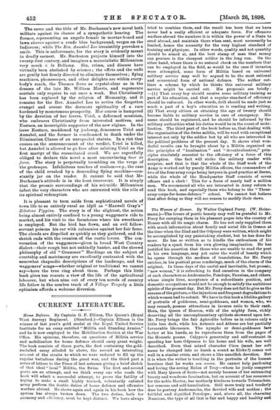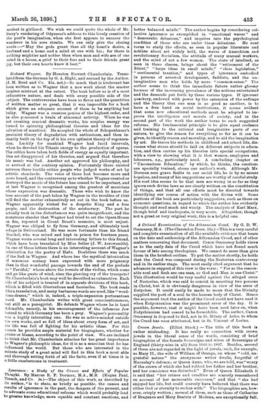The Women of Homer. By Walter Copland Perry. (W. Heine-
mann.)—The lovers of poetic beauty may well be grateful to Mr. Perry for carrying them in his pleasant pages into the country of Homer with all its magic charm. He has not only supplied them with much information about family and social life in Greece at the time when the Iliad and the Odyssey were written, which might be accomplished by any painstaking student, but he has done far more. He has so written as to kindle the enthusiasm of his readers by a spark from his own glowing imagination. He has justified his assertion that those who are unable to read the poet in his own language, may yet enter the world of beauty which he opens through the medium of translations, for Mr. Perry catches, in his poetical prose renderings, much of the charm of the original. In these days of the useful and inevitable, but prosaic, "new woman," it is refreshing to find ourselves in the company of such characters as Andromache, Penelope, Nausicaa, and others, whose simple lives, acceptance of a subordinate position, and domestic occupations would not be enough to satisfy the ambitions spirits of the present day. But Mr. Perry does not fail to give us the reverse of the picture,—the injustices and frequent degradations to which women had to submit. We have in this book a lifelike gallery of portraits of goddesses, semi-goddesses, and women, who, we may remark, possess attractions in inverse ratio to their rank, Hera, the Queen of Heaven, wife of the mighty Zeus, richly deserving all the uncomplimentary epithets showered upon her. Mr. Perry brings the fair Aphrodite before WI in colours only a little leas dark, while his Artemis and Athene are but partially favourable likenesses. The nymphs or demi-goddesses fare better at his hands, as he reproduces them from the pages of the Homeric poems. Calypso's generosity and self-restraint in speeding her hero Odysseus to his home and his wife, are well described. Even that mixed character Circe (must her soft name be changed into so harsh a sound as Kirke l') comes out well in a similar crisis, and shows a like unselfish devotion. But it is when the writer is touching in the portraits of the human heroines that he works con amore. He cannot help pardoning and loving the erring Helen of Troy—whom he justly compares with Mary Queen of Scots—not merely because of her entrancing beauty and wondrous fascination, but on account of her reverence for the noble Hector, her motherly kindness towards Telemachus, her remorse and self-humiliation. Still more truly and tenderly does he portray Andromache, the devoted wife and mother ; the faithful and dignified Penelope ; and, above all, the charming Nausicaa, the type of all that is fair and happy and healthy and modest in girlhood. We wish we could quote the whole of Mr. Perry's rendering of Odysseus's address to this lovely creation of the poet's imagination, when she first appears to succour the wanderer in his sore straits. We can only give the closing words :—" May the gods grant thee all thy heart's desire, a husband and a home and a mind at one with his ; for there is nothing mightier and nobler than when man and wife are of one mind in a house, a grief to their foes and to their friends great joy, but their own hearts know it best."







































 Previous page
Previous page